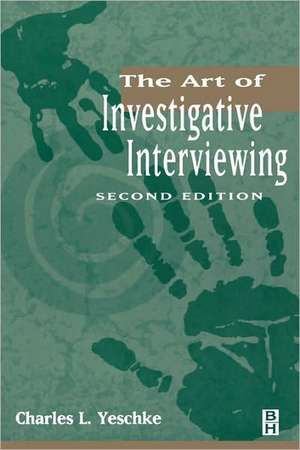The Art of Investigative Interviewing
en Paperback – 31 oct 2002
Drawing elements from psychology, philosophy, and sociology, Charles Yeschke applies the theory of human need to the process of investigative interviewing. This theory is the most important component of the successful interview and is crucial to an investigator's ability to correctly interpret human behavior.
* Covers the rising debate over interviewing and interrogative ethics
* Provides all-new case studies demonstrating the application of the author's techniques
* Shows how to boost your success rate by replacing coercion and confrontation with persuasion and communication
Preț: 313.28 lei
Nou
Puncte Express: 470
Preț estimativ în valută:
59.98€ • 62.46$ • 49.77£
59.98€ • 62.46$ • 49.77£
Carte tipărită la comandă
Livrare economică 06-20 februarie
Preluare comenzi: 021 569.72.76
Specificații
ISBN-13: 9780750675956
ISBN-10: 0750675950
Pagini: 244
Dimensiuni: 155 x 234 x 12 mm
Greutate: 0.36 kg
Ediția:0002
Editura: Elsevier
ISBN-10: 0750675950
Pagini: 244
Dimensiuni: 155 x 234 x 12 mm
Greutate: 0.36 kg
Ediția:0002
Editura: Elsevier
Public țintă
Law enforcement officers, private investigators, psychologists, psychiatrists, social workers, and students in criminal justice and related fieldsCuprins
Mission Statement
Introduction
1. Ethical Standards and Practices
2. Human Needs and Deception in the Interview
3. Preparing for the Interview
4. Evidence
5. Public and Private Interviewing
6. Rapport and Active Listening
7. Authority and Neutrality in the Investigative Interview
8. The Self-Fulfilling Prophecy
9. Overview of the Interview Process
10. Setting, Location, Intensity, and Approach in the Interview
11. Questions and Questioning
12. Three Case Studies
Introduction
1. Ethical Standards and Practices
2. Human Needs and Deception in the Interview
3. Preparing for the Interview
4. Evidence
5. Public and Private Interviewing
6. Rapport and Active Listening
7. Authority and Neutrality in the Investigative Interview
8. The Self-Fulfilling Prophecy
9. Overview of the Interview Process
10. Setting, Location, Intensity, and Approach in the Interview
11. Questions and Questioning
12. Three Case Studies
